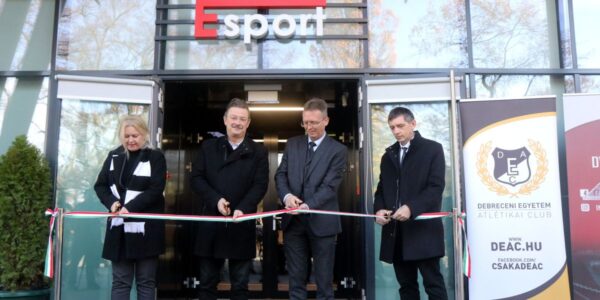The 330-square-metre, 300 million HUF investment – partly financed by the government and partly by the university itself – has made the centre the largest e-sports facility in the country, specifically for educational purposes, and it can be used by up to 100 people at a time.
Zoltán Bács, chancellor of the university, said at the inauguration ceremony of the facility built in the Nagyerdei Stadium that the e-sports centre is primarily for educational purposes, as it supports the training of the faculties of computer science, economics and engineering, and can also be used by DEAC and DVSC e-sports players.
The University of Debrecen is considered one of the strongholds of Hungarian e-sports, both because of its e-sports department, the DEAC-Hackers, and because of its scientific research in the field of e-sports, the University of Debrecen said in a press release.
Balázs Hankó, Deputy State Secretary for Higher Education, said that there is a growing need for young people to obtain a degree in technical and IT fields. “Among them, online games and e-sports are becoming increasingly popular. We are taking advantage of their popularity to attract young people, who can then go on to higher education to learn about IT and engineering,” he said.

Marianna Kovács, Managing Director of the Debrecen University Athletics Club; Zoltán Bács, Chancellor of the University of Debrecen; Balázs Hankó, Deputy State Secretary for Higher Education and András Hajdu, Dean of the Faculty of IT (from left to right) at the inauguration of the E-Sports Centre (Photo: MTI/Vajda János)
Balázs Hankó pointed out that
“They could be the IT and technical specialists of the future,” he added. He also stressed that 7425 IT students were admitted to universities in the country this year.
András Hajdu, dean of the IT faculty, pointed out that because the graphics cards of the machines in the facility are very powerful, these computers can also handle educational tasks that require a lot of computing power. He gave as examples artificial intelligence-based models, computer graphics and virtual reality.
We recently reported that the Hungarian team won three bronze medals at the European Girls’ Olympiad in Informatics (EGOI), a competition designed to encourage more women to choose a career in the ICT sector.